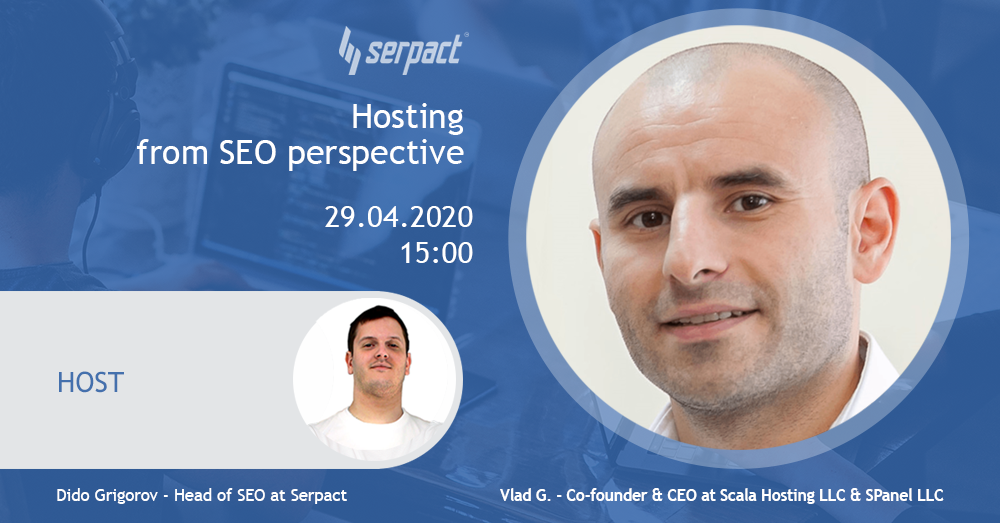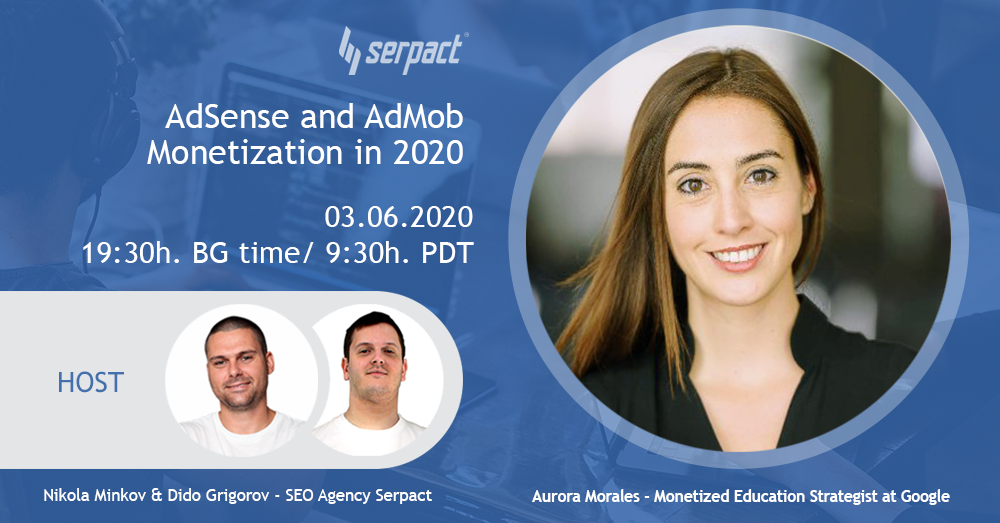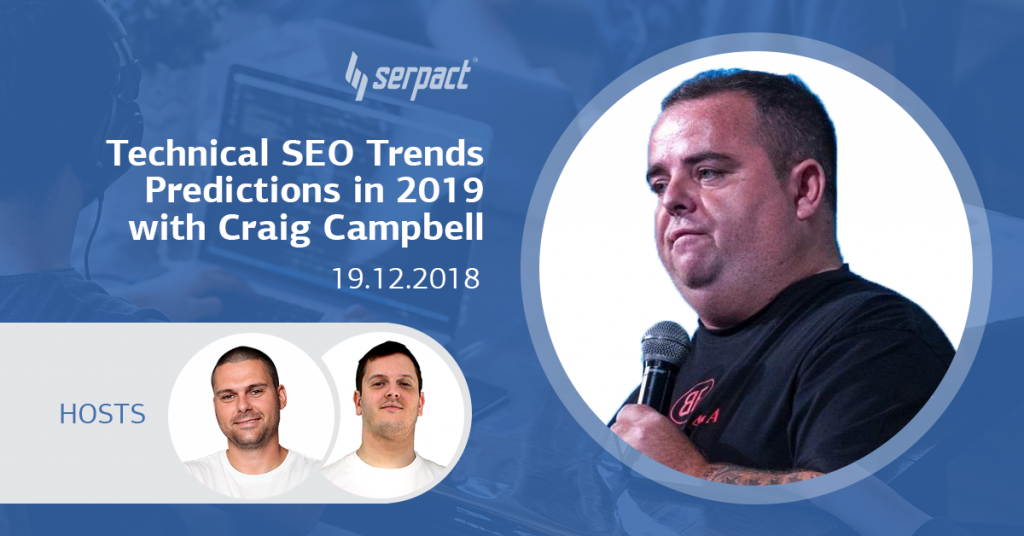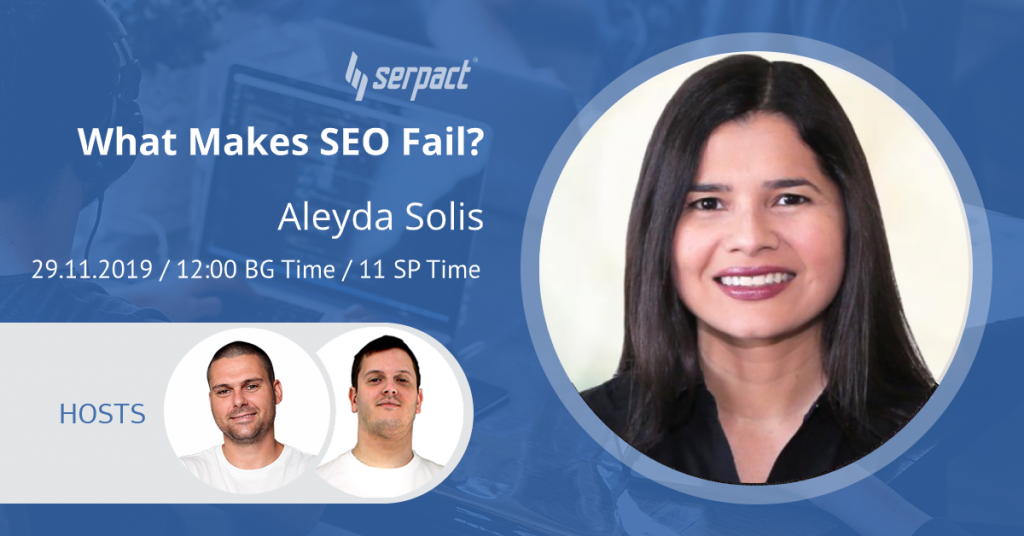Webinar Recap: From Javascript SEO to the new GSC with John Mueller

Here we show you a synopsis of the long-waited webinar From Javascript SEO to the new GSC with John Mueller. It was organized by Serpact and Google and the event enjoyed high interest. During the peak moments 50 people were watching and asking their questions. Other world software brands that organize similar online webinars have never gathered so many people during their event in one and the same hour
You can watch here a full record of the webinar:
John Mueller /Webmaster Trends Analyst/ is the expert from Google who is often searched for an advice by webmasters and optimizers around the world. It’s an honor for Serpact that John agreed to have a conversation with us. This happens for the first time in Bulgaria – a high level expert from Google to speak to the Bulgarian public and answer questions.
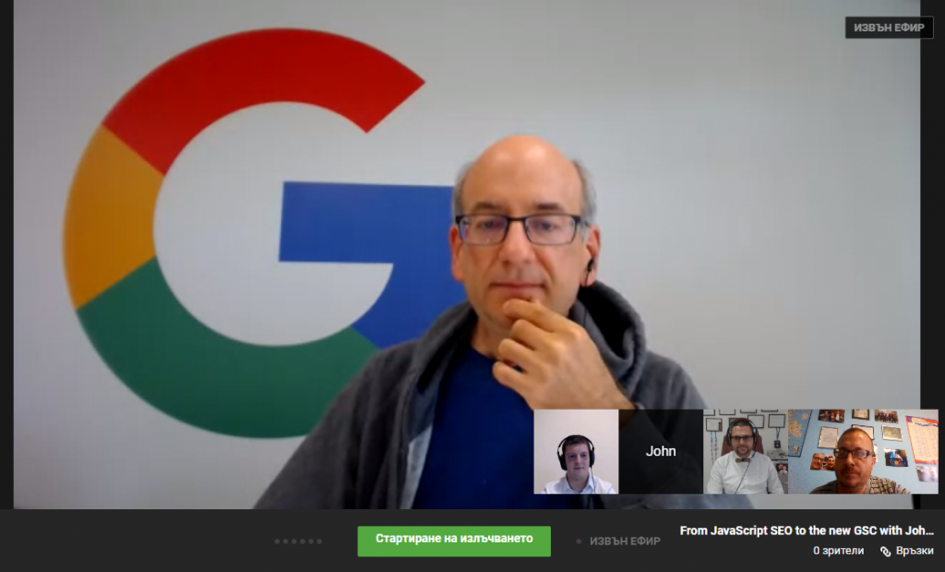
We go directly to the questions from Serpact and the public as well as John’s answers. The purpose of doing all this is to gain knowledge and become more effective.
Nikola Minkov: John, what is the current condition of Google Search Console? What are the newest options of the console you are working on? Can you share this information in public?
John Mueller: In general we don’t make any announcements in advance. But I can say that right now we are making a transition to the new console version and we send letters about website problems and we also make tests.
Dido Grigorov: Why sometimes Google Search Consle says that a certain page is not indexed but we find it in the search results?
John Mueller: It’s difficult to explain in general because it’s specific for every web address. Sometimes there is a time delay. We have different data in each of our data centers and that’s why it takes time for the data to be actualized and synchronized. Such a situation should not be a reason to worry. Don’t focus too much on one URL address and look at the bigger picture, your website should become better.
Dido Grigorov: How much does it take for a web address to be indexed?
John Mueller: This will take different amount of time: hours or days depending on many factors, from the website itself or whether its speed is decreased and other things.
Nikola Minkov: Speed is very important for a website, isn’t it, John?
John Mueller: Yes, speed is very important factor. It’s not very important for Goggle but still. Speed is essential for the website users as it helps them quick and easy to view it and order products. Good speed leads to a better user experience on the website of course.
Dido Grigorov: One month ago a form was spread in Twitter that concerns interviews with webmasters. Can you share with us information about a research you are doing for Search Console Messaging?
John Mueller: We try to make regular researches among users, use beta testers, analyze, etc. We try to find the best data from the right people.
Question from the public: Whether AdBlockers block ga.js or GTM tag? If yes, is there any way to fix this?
John Mueller: I am not sure how AdBlockers work but even if they block ga.js or GTM tag this concerns Google Analytics / and the measure statistics in it but doesn’t influence the results in it.
Dido Grigorov: When you think we will see ready the new version for Google Search and when the old version will stop working?
John Mueller: We are now adding a lot more things in the new search console and removing some old things. It’s a complex job which takes time and cannot happen right away, it’s a process.
Questions from the public: Should we worry about competitors that try to manipulate SERP with artificially generated searches for their brand + the keyword they are searching?
John Mueller: Such practices are very old, we have a rich experience with similar and the attempts for ad misuse of Google Ads, fake clicks, artificial searches, but it’s not effective and it’s a loss of time.
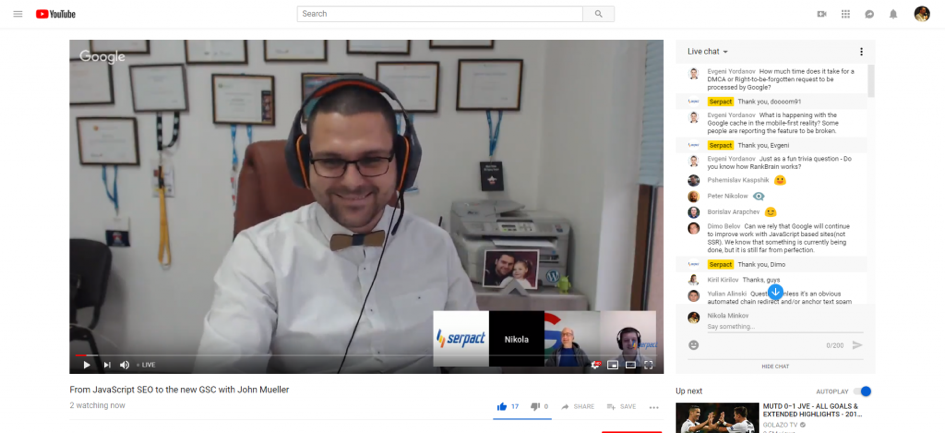
Nikola Minkov: Do you plan to create and implement new Schema.org types?
John Mueller: Schema.org is a separate organization and other people take care of its development. But I would recommend you to think about how you want your website to be found in google and implement the corresponding type of structure data .
Dido Grigorov: HowTo, QA and FAQ – we see that you from Google work with this data to show results for them in SERP. What is the current state of this data and can we expect from them to always show in the results ?
John Mueller: As I said these results depend on other people. But we constantly perform make experiments to see which is better and which not. First, one type of data is tested in a certain language and at a territory. For example in English and only in USA because it’s easier for our engineers. After this if the task is successful the data is globally introduced. For instance structure data for Jobs has enjoyed big growth and improvement recently.
Question from the public: Whether the penalties for spam-structured data influence the traffic and what we should do if we have a loss in traffic no matter how lightweight the website is?
John Mueller: If you have manual penalty and after this you make your website lightweight and send a request for check, the people checking your website you will see that it doesn’t have content and there is nothing to be ranked or get traffic. That’s why you should make sure that your content is meaningful and useful and then implement structured data in it.
Question from the public How long does it take DMCA request and Right-to-be-forgotten request to be processed by Google?
John Mueller: Every request is processed manually but I don’t know how long it will take, it depends on the case. Cases like this are handled by our jurisdictional team not by our engineers.
Nikola Minkov: What do you think about Schema Markup type for restaurants, menus and similar stuff that should include price, meal price, direct meal order, etc. shown in the form of Graph panel?
John Mueller: This requires rethinking because there a lot of restaurants and many similar businesses that need to make much effort to publish their menus, meals, prices, etc. Not all of them have the needed technical knowledge to do this. And when we have 1000 restaurants and we show 5 menus this won’t be very useful and good.
Dido Grigorov: Javascript SEO: What are the common problems with crawling and indexing that should be considered when we use React, Single Page Application and other JavaScript- frameworks? What we should be aware about?
John Mueller: We should seek knowledge about how JS works and how SEO works. You should seek contact with developers that use Java Script and find solutions about your problems. We cannot stay only with HTML. Many developers JS and we should pay attention to this.
Nikola Minkov:: John, in Twitter you said that Google already cannot read and fulfill “_escaped_fragment_=” but it can read and fulfill URLs with “#!”, can you confirm this?
John Mueller: The old Ajax crawling is old – almost 7 years. It was used for crawling addresses with “_escaped_fragment_=” and these with“#!” and these with “#!”, it didn’t read the address with “#!”,but started reading another address . This problem is now fixed.
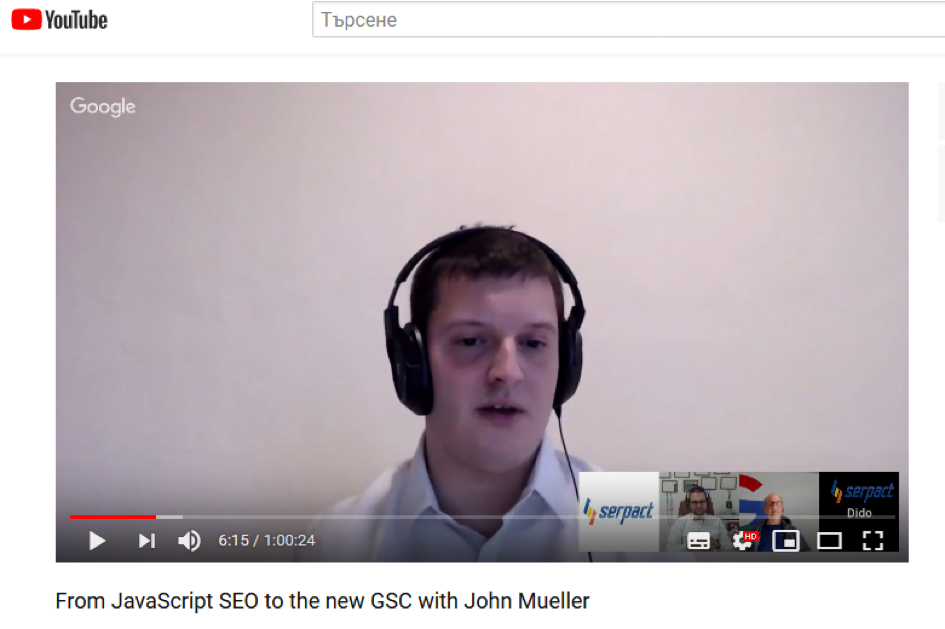
Question from the public How long Google caches JS and CSS resources?
John Mueller: I don’t have an exact time for this. We try more aggressively to cache but without doing harm to the website, to his function and design.
Question from the public: Can we rely on the fact that Google can continue to improve its work with JavaScript –based websites (not SSR). But we know that this thing is currently being developed and there are a lot more things to be done.
John Mueller: We will certainly continue to improve Google’s work with JavaScript. Of course there will always be some elements that are more difficult and cannot be “understand”.
Dido Grigorov: Sometimes we have resources that are damaged, don’t work properly or don’t load such as JS, CSS or photos. Does this influence Google or it’s all about the user experience again?
John Mueller: No, they don’t have an important role for us. As long as they don’t do damage to the content load there is no problem.
Question from the public: How long does it take to a GoogleBot to crawl or render a web page?
John Mueller: There is no fixed time . Sometimes is faster, sometimes is slower. It depends on the website and how often it’s renewed. But there is a certain delay.
Question from the public: How Google treats resources in a website (CSS, JavaScript, images) or they are on a CDN or on a separate domain versus CDN on a subdomain?
John Mueller: In one in the same way. The only thing that I will be worried about are the photos because we should crawl them again in order to relevantly display them in Google Images. You can use redirect 301 from the old to the new photos addresses to show the bot clearly what is going on.
Question from the public: Do you thing that AMP will become the new standard in the future and we should make our web pages to be fully AMP-based? Will this be useful for e-commerce websites or news websites?
John Mueller: AMP is not obligatory. It’s up to you to decide whether to use it or not but it really makes websites quick and reliable. Before choosing to implement AMP in your website, the website’s design and complexity should be changed.
Dido Grigorov: Should we worry if we notice bugs in our website in Search Console or we should look at the large scale?
John Mueller: If you have bugs, check them and it’s better to fix them. But always check at least twice – sometimes it’s possible for a bug to be caused by a plugin which was fixed afterwards and the bug disappeared but the problem notification in the console continues to stay.
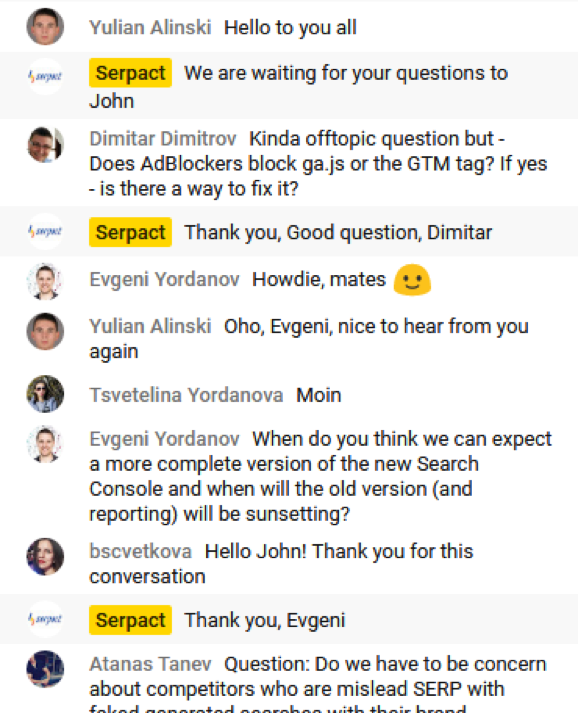
Question from the public: John, what do you think about projects that combine PWA and AM?
John Mueller: It’s an interesting combination but it’s not easy to implement both technologies together. And as long as AMP has good plugins when it comes to PWA you will need a programmer to work on the code.
Question from the public: Featured snippets are not shown in some countries like Bulgaria for example but some snippets like rating /from Product Markup/ work well? When we can expect to see featured snippets in Bulgaria ?
John Mueller: I have no idea.
Borislav Arapchev: Whether Google “understands” the positive and negative texts? Whether a positive text can influence the trust and reputation?
John Mueller: I don’t know about this because text is difficult for analyzing. When someone talks about some brand they may use a sarcasm, jargon, etc. and it’s really difficult to understand the emotion and attitude towards this text.
Dido Grigorov: Is it good to do Disavow of the links and how often you recommend us to do it?
John Mueller: We mainly try to automatically access the links coming to us. And these which are given a Disavow by you often come from penalized websites. I recommend you to use Disavow tool, although most websites don’t need it. You can check your link profile for as often as once a week but not more often.
Question from the public: Do you plan to implement operators connected with the JavaScript websites? For example an operator that notifies your blog that the webpage is ready and it doesn’t await outbound AJAX request to be done?
John Mueller: We try to unify our instruments so that they can analyze all types of websites no matter what technology they use.
Question from the public: Is this bad for our website if another webmaster with malicious intent places our website’s domain in its Google Disavow file?
John Mueller: No.
Question from the public: Whether a website that gets a problem notification with Mobile Usability will automatically be penalized or lowered in SERP?
John Mueller: When we learn that a webpage is not mobile-friendly, it doesn’t have this rate in the mobile-first results in Google. This is not the only and most important factor, so don’t worry.
Question from the public: If a website offers its users one and the same content for the whole German speaking auditory /DE-AT-CH/ under one domain (.de), is there a point in using hreflang with one and the same URL?
John Mueller: Is there an only one language version of a website, for example only in German, hreflang won’t change anything.
Serpact: John, it’s time for the end and for the funniest part of the webinar. So, our question is what is the most suitable Alt Tag for this image?

John Mueller:: Oh, this is Barry, let’s put an alt tag – Search Personality of the Year – Barry Schwartz!
Final advice by John for the Our SEO community:
Make sure your web site is technically developed, write your content in a comprehensible way for your public and offer answers to your clients’ questions. Then we will see you’re your website is helpful and show it in a way it deserves!

